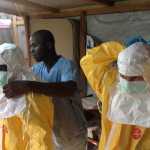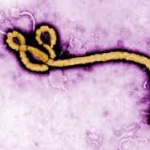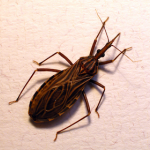It seems that for some, Monkeypox is a derogatory term. I’m unsure whether this has to do with the use of the word "monkey," its association with Africa, or some other ill-defined reason. To be fair, naming diseases is important, especially in a time of social media; we all want to be worrying and arguing about the same problem. Not to worry, the World Health Organization has issued some best practices.
ebola
The world anxiously awaits while clinical trials of remdesivir are in progress. The drug failed to stop Ebola. Does this mean it will also fail to stop coronavirus? No. According to a new study in the Journal of Biological Chemistry, the drug should work better. Here's why.
Three pigs tested positive for antibodies to the Ebola virus, suggesting that these farm animals could serve as a host for the disease. Virus hunters should take note.
Ebola has returned to Africa, specifically the Democratic Republic of Congo. Unlike 2014, we now have a vaccine.
A phylogenetic and epidemiological analysis suggests that people who died from Ebola possibly spread the virus to more people than those who survived.
The Centers for Disease Control and Prevention (CDC) just announced they are temporarily suspending work by lab scientists in BSL-4 (aka biosafety level 4) facilities. They recently learned their current stock of air hoses that attach to the protective suits worn by staff have not been certified for breathing air.
Our public health system has a very bad habit of fighting the last war. Instead, it's best to prepare for exotic diseases before they become uninvited guests. Will policymakers apply that lesson to another potential troublemaker: Chagas disease?
Our public health strategy tends to be reactionary rather than preventative. Thus, instead of focusing most of our efforts in preparation for what is coming next, we are dumping limited resources on battles already fought. This is a dangerous gamble, considering that the Ebola virus has deadly cousins.
Microbiologists don't use microscopes very often. The reason is because a substantial proportion of modern microbiology research uses the tools of molecular biology, for which microscopes are not needed.
Many may think the Ebola epidemic ended when major U.S. news outlets stopped covering it. However, the epidemic has raged on for over a year in West Africa. But there is some good news: the three countries at the center of the epidemic have not reported any new cases in over a week.
ACSH friend Dr. David Seres, the director of nutritional medicine at Columbia Presbyterian Medical Center, wrote a thought-provoking piece in The Hill about rampant Ebola paranoia the US, entitled What we learned from Ebolanoia .
Today s NYTimes Personal Health column by Jane E. Brody could pass for an ACSH publication: Emotion Is Not the Best Medicine. How many times have we said that? She uses the Ebola hysteria as her hook, but the column is replete with wise words.






